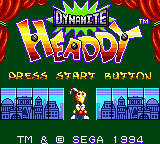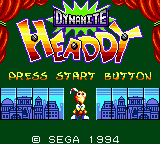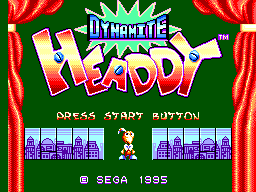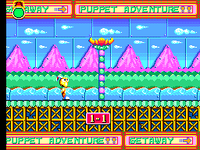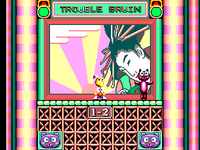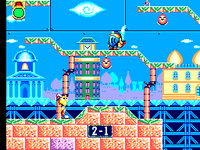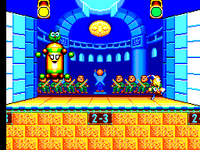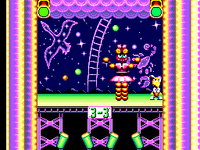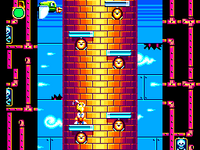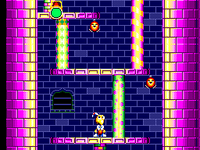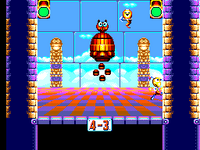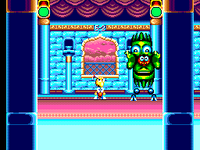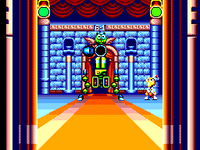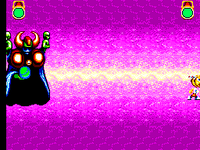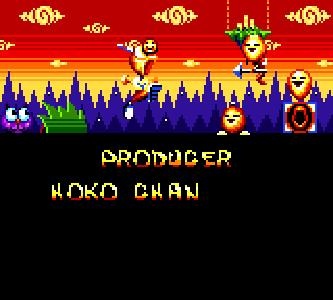- For the Sega Mega Drive game, see Dynamite Headdy.
Dynamite Headdy (ダイナマイトヘッディー) is a platform game developed by Minato Giken and published by Sega Enterprises, Ltd. for the Sega Game Gear, based on the Sega Mega Drive game of the same name originally developed by Treasure. Tec Toy also brought it to the Sega Master System in Brazil.
These 8-bit versions are similar to their 16-bit counterpart on the Mega Drive, but features a smaller set of levels and different boss fights.
Story
| “
|
On-stage Rampage! The curtain is raised, and the Treasure Theater Show begins. The star of the show is Dynamite Headdy, the guy with the coolest head on stage.
But danger lurks backstage—Trouble Bruin, a henchman of Dark Demon, stirs up trouble as he tries to do away with Headdy! But Trouble Bruin is small stuffing compared to Dark Demon, who strives to rule the world by converting its inhabitants into his evil minions! Most devastating are the Keymasters, who serve as Dark Demon's elite guard.
As Dynamite Headdy, it's up to you to defeat Dark Demon and restore peace to the world. Step into the spotlight and a world where the props go wild and nothing is as it seems. Remember—a cool head always prevails!
|
„
|
— US manual[7]
|
The game stars Headdy, a heroic puppet with interchangeable heads who was captured, but was rejected and has escaped from incineration. He must defeat the evil Dark Demon, an evil emperor who wishes to take over the land of puppets. Along the way, he will face opposition by Trouble Bruin/Maruyama, a bear doll who lurks backstage to pursue Headdy at every turn possible in order to defeat him and take over the show. Heather/Fingy, who collects the keys from bosses, is nowhere to be seen in this version.
Gameplay
Gameplay in the 8-bit versions of Dynamite Headdy is largely the same as the Mega Drive version, in which the player travels across levels known as "Scenes", each of which are split into multiple levels. Compared to the Mega Drive version, there are only six scenes with fewer levels.
The core mechanic of the game is Headdy's head, which can detach from his body in eight directions for a variety of purposes by pressing  , the most common of which is to attack enemies. Besides attacking, Headdy can also use his head to interact with other objects such as boxes and switches, or to grab on to HangMan to pull himself to high places or to bring platforms into reach. Headdy can also upgrade his head with temporary Power Up Heads provided to him by HeadCase; Headdy can only use them for a short amount of time. These powerups cannot be cancelled manually in this version of the game.
, the most common of which is to attack enemies. Besides attacking, Headdy can also use his head to interact with other objects such as boxes and switches, or to grab on to HangMan to pull himself to high places or to bring platforms into reach. Headdy can also upgrade his head with temporary Power Up Heads provided to him by HeadCase; Headdy can only use them for a short amount of time. These powerups cannot be cancelled manually in this version of the game.
Like the Mega Drive version, the game has multiple bosses to fight, with Scenes having mini-bosses that appear at specific points. Unlike the Mega Drive version, most of the major bosses, encountered in the final level of each Scene, are battles against Trouble Bruin/Maruyama, though Beau will still appear to indicate weak points to the player. Secret Bonus Points are hidden all over each Scene in the game, and are found by meeting certain conditions such as defeating specific enemies or mini-bosses, destroying certain targets, or attacking Bino. Finding Secret Bonus Points only serves to increase the player's score at the end of each Scene.
Items
|
|
Star
|
| Awards 50 points.
|
|
|
Banana
|
| Restores a portion of Headdy's health.
|
Power Up Heads
The 8-bit versions have a far smaller number of Power Up Heads, with only five of them being available:
|
|
Slammer Head
|
| Doubles Headdy's attack power.
|
|
|
War Head
|
| Automatically sprays projectiles in eight directions all around Headdy. Has the appearance of the Pig Head in this version.
|
|
|
Super Head
|
| Makes Headdy move faster and jump higher, and increases his attack range.
|
|
|
Sleepy Head
|
Makes Headdy fall asleep to regain health. This can leave him vulnerable to attacks, however. Button  can be pressed to make Headdy wake up early. can be pressed to make Headdy wake up early.
|
|
|
Vacuum Head
|
Sucks in all nearby enemies and items when  is held. Headdy cannot grab on to HangMan with this head. is held. Headdy cannot grab on to HangMan with this head.
|
Scenes
|
|
1-1: The Getaway/Escape Hero!
|
| The game opens with an auto-running section in which Headdy must clear obstacles in his path as he runs. In this version, the Spikes land in front of Headdy instead of behind him, and must be destroyed by hitting them in order to proceed. The Robo-Collector does not appear in this version.
|
|
|
1-2: Bear Essentials/Maruyama First
|
| The first battle against recurring boss Trouble Bruin/Maruyama is split off into its own sub-scene from the previous section. His attack pattern is the same in that he will charge at Headdy, only to hit the left side of the screen and become vulnerable from the recoil, except he will not charge his attacks. It takes four hits to defeat him.
|
|
|
2-1: Toys N the Hood/Puppet Town
|
| The first proper level in the game, with various platforms and objects to interact with. The first sections of the level are in line with the same Scene in the Mega Drive version, though later sections are based on Scene 4-1 from the Mega Drive version, featuring Happy Campers.
|
|
|
2-2: Back Stage/Backstreet Trio
|
| This level is based on the backstage areas of the Mega Drive version's Scene 4-1, but with additional mini-bosses. The first mini-boss is Catherine Derigueur/Catherine Degoon (normally fought in Toys in the Hood), the second mini-boss is the Super Tank Machine, and Rebecca remains in place as the third mini-boss.
|
|
|
2-3: Opening Night/Maruyama Walnut Cut
|
| Instead of fighting Mad Dog/Bounty Boundy, the player fights Trouble Bruin/Maruyama in a suit based on the Mega Drive version's boss. Trouble Bruin bounces back and forth between both sides of the screen, causing objects to fall on Headdy. His weak point is the tail.
|
|
|
3-1: Going Underground/Volcanic Cave Set
|
|
|
|
|
3-2: Hooked/Hi-Speed Rale Set
|
|
|
|
|
3-3: Stagestruck/Maruyama Prima Donna
|
|
|
|
|
4-1: Stepping Up/Crumble Tower
|
|
|
|
|
4-2: Rising Fun/Tower Inside Bone
|
|
|
|
|
4-3: Hi Anxiety/Maruyama King of Sky
|
|
|
|
|
5-1: Room Service/Multiplex Castle
|
|
|
|
|
5-2: Twin Freaks/Maruyama Twin Faces
|
|
|
|
|
6-1: Fatal Contraption/Maruyama Last Chance
|
|
|
|
|
6-2: Finale Analysis/Final Attack!
|
|
|
Versions
Localised names
Also known as
| Language
|
Localised Name
|
English Translation
|
| English
|
Dynamite Headdy
|
Dynamite Headdy
|
| English (US)
|
Dynamite Headdy
|
Dynamite Headdy
|
| Japanese
|
ダイナマイトヘッディー
|
Dynamite Headdy
|
| Portuguese (Brazil)
|
Dynamite Headdy
|
|
Production credits
Game Gear version
- Producer: Hoko Chan
- Director: Garry
- Planner: Oop Mash
- Programmers: Shinji Uniyama, Nodoka Koharubi, Ken Matudaira
- Designers: Quest Kubo, Oop Mash, EI EI O, Bon
- Sound: Ako Matudaira
- Special Thanks To: Ogata, Endo, Yumeko Hosino, Akemi Chan, Kanshu, Treasure
- Interpreters: Shinobu Shindo, James Spahn
Source: In-game credits[8]
Master System version
- Producer: Hoko Chan
- Director: Garry
- Planner: Oop Mash
- Programmers: Shinji Uniyama, Nodoka Koharubi, Ken Matudaira
- Designers: Quest Kubo, Oop Mash, EI EI O, Bon
- Sound: Ako Matudaira
- Special Thanks To: Ogata, Endo, Yumeko Hosino, Akemi Chan, Kanshu, Treasure
- Interpreters: Shinobu Shindo, James Spahn
Source: In-game credits[9]
- Producer: Maxwell Taylor
- Game Testers: Blair Bullock, Greg Fleming, Tracy Johnson, Xen Lang, Jay Mijares, Joe Perez, Ilya Reeves, Chris Sinclair, Steve Smith, Mark Subotnick, Terry Thomas, Gregg Vogt
- Interpreter: Jill Alexander
- Product Manager: Chrissie Huneke
Source: In-game credits[9]
Magazine articles
- Main article: Dynamite Headdy (8-bit)/Magazine articles.
Promotional material
- Main article: Dynamite Headdy (8-bit)/Promotional material.
Physical scans
Game Gear version
| {{{{{icon}}}|L}}
|
Division by zero.
|
Based on
0 review
|
| Game Gear, JP
|
|
|
 Cart  Manual |
| Game Gear, US
|
|
|
 Cart  Manual |
| Game Gear, EU
|
|
|
 Cart  Manual |
| Game Gear, FR (Blister pack)
|
  Cover
|
|
|
| Game Gear, PT
|
|
|
 Cart  Manual |
Master System version
| Master System, BR
|
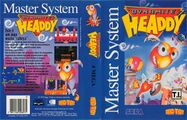 Cover
|
 Cart |
Technical information
ROM dump status
| System |
Hash |
Size |
Build Date |
Source |
Comments |
|
|
|
| ?
|
| CRC32
|
f6af4b6b
|
| MD5
|
79a0d819e9cddebcb80e28a174ff2005
|
| SHA-1
|
a8e3f447089537b52e40958c07610bfead82442d
|
|
512kB
|
|
Cartridge (JP)
|
|
|
|
|
| ?
|
| CRC32
|
610ff95c
|
| MD5
|
2da61f019f30eb0795cfd6eb9d5b54c6
|
| SHA-1
|
a8c8b5252a885d466e044e6055336513d988e661
|
|
512kB
|
|
Cartridge (US/EU)
|
|
|
|
|
| ?
|
|
|
1994-07-06
|
|
|
|
|
Page
|
| ?
|
|
|
1994-07-05
|
|
|
|
|
Page
|
| ?
|
|
|
1994-07-01
|
|
|
|
|
Page
|
| ?
|
|
|
1994-06-15
|
|
|
|
|
Page
|
| ?
|
| CRC32
|
7db5b0fa
|
| MD5
|
7f57481d870465fc3a6412d87f0a8e38
|
| SHA-1
|
12877c1c9bfba6462606717cf0a94f700ac970e4
|
|
512kB
|
|
Cartridge (BR)
|
|
|
|
|
References
- ↑ File:Dynamite Headdy GG EU Box Back.jpg
- ↑ File:DynamiteHeaddy GG JP Box Front.jpg
- ↑ 3.0 3.1 https://sega.jp/history/hard/gamegear/software.html (Wayback Machine: 2018-12-07 04:57)
- ↑ Electronic Gaming Monthly, "August 1994" (US; 1994-xx-xx), page 146
- ↑ 5.0 5.1 Sega Magazine, "November 1994" (UK; 1994-10-15), page 96
- ↑ Mean Machines Sega, "April 1995" (UK; 1995-02-28), page 36
- ↑ File:Dynamite Headdy GG US Manual.pdf, page 3
- ↑ File:Dynamite Headdy GG credits.pdf
- ↑ 9.0 9.1 File:Dynamite Headdy SMS credits.pdf
- ↑ Beep! MegaDrive, "August 1994" (JP; 1994-07-08), page 24
- ↑ Electronic Games (1992-1995), "October 1994" (US; 1994-xx-xx), page 78
- ↑ Electronic Gaming Monthly, "September 1994" (US; 1994-xx-xx), page 38
- ↑ Famitsu, "1994-08-12" (JP; 1994-07-29), page 41
- ↑ Freak, "11/94" (IL; 1994-xx-xx), page 1
- ↑ GamePro, "September 1994" (US; 1994-xx-xx), page 140
- ↑ GamePro, "Oktober 1994" (DE; 1994-09-30), page 52
- ↑ Game Informer, "November 1994" (US; 1994-1x-xx), page 58
- ↑ Mega Force, "Septembre 1994" (FR; 1994-0x-xx), page 116
- ↑ Mega Fun, "10/94" (DE; 1994-09-21), page 61
- ↑ Player One, "Septembre 1994" (FR; 1994-0x-xx), page 52
- ↑ Play Time, "11/94" (DE; 1994-10-05), page 106
- ↑ Sega Power, "November 1994" (UK; 1994-09-29), page 62
- ↑ Sega Saturn Magazine, "September 1995" (JP; 1995-08-08), page 88
- ↑ Todo Sega, "Noviembre 1994" (ES; 1994-1x-xx), page 50
- ↑ Video Games, "12/94" (DE; 1994-11-23), page 131
- ↑ VideoGames, "October 1994" (US; 1994-xx-xx), page 78
![]() , the most common of which is to attack enemies. Besides attacking, Headdy can also use his head to interact with other objects such as boxes and switches, or to grab on to HangMan to pull himself to high places or to bring platforms into reach. Headdy can also upgrade his head with temporary Power Up Heads provided to him by HeadCase; Headdy can only use them for a short amount of time. These powerups cannot be cancelled manually in this version of the game.
, the most common of which is to attack enemies. Besides attacking, Headdy can also use his head to interact with other objects such as boxes and switches, or to grab on to HangMan to pull himself to high places or to bring platforms into reach. Headdy can also upgrade his head with temporary Power Up Heads provided to him by HeadCase; Headdy can only use them for a short amount of time. These powerups cannot be cancelled manually in this version of the game.
